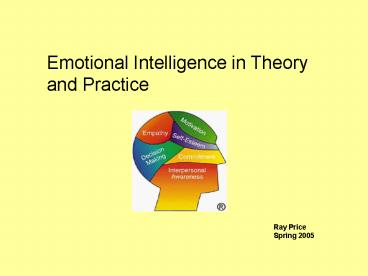Emotional Intelligence in Theory and Practice - PowerPoint PPT Presentation
1 / 10
Title:
Emotional Intelligence in Theory and Practice
Description:
Become familiar with the objectives and requirements of the class ... and effectively apply the power and the acumen of emotions as a source of human ... – PowerPoint PPT presentation
Number of Views:149
Avg rating:3.0/5.0
Title: Emotional Intelligence in Theory and Practice
1
Emotional Intelligence in Theory and Practice
Ray PriceSpring 2005
2
Our objectives for class today are to
- Become familiar with some common definitions of
EI - Establish the value of EI
- Become familiar with the objectives and
requirements of the class - Get acquainted with someone in the class
3
List characteristics of an intelligent person
List characteristics of an emotionally
intelligent person
4
How do we define Emotional Intelligence? I.
The ability to sense, understand, and
effectively apply the power and the acumen of
emotions as a source of human energy,
information, connection, and influence. (Robert
Cooper, xiii)
5
How do we define Emotional Intelligence? II.
The capacity for recognizing our own feelings
and those of others, for motivating ourselves,
and for managing emotions well, in ourselves and
others. (Daniel Goleman)
6
EI is a better predictor of academic success than
IQ
- 64 first-year college students
- 33-item EI scale
- The EI scale predicted end of year GPA (r(63)
0.32) - even though EI scores were not related to SATs
(r(41) -0.06) (Schutte et al.1998).
7
EI is a key factor in job performance
Q What distinguished the top performing
engineers scientists with high academics and
high I.Q.s at Bell Labs from others? A
Emotional Intelligence motivation, initiative,
rapport, ability to take on extra
responsibilities, ability to take full and
immediate advantage of informal networks and
teams. (Kelley and Caplan, Harvard Business
Review, 1993)
8
We will begin with the foundation of
self-awareness and progress towards interpersonal
skill-building
9
Take Home Messages
1. Emotions are real. 2. Emotions are valuable.
Emotions provide information provide
energy assist growth Therefore, EI gives you
an advantage!
10
There are four main areas of Emotional
Intelligence
Positive impact on others































